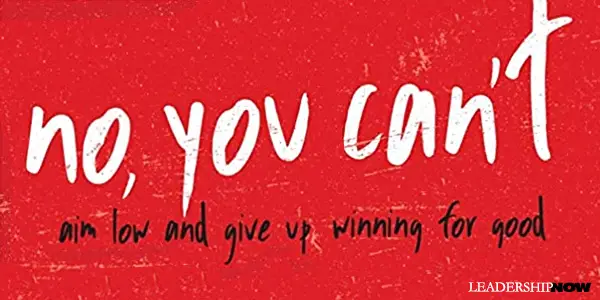 |
 |
08.26.20

No, You Can't
SOMETIMES after you’ve heard it all and seen all of the memes telling you that you can win, you can be anything you want, and the universe is just waiting to hand it all to you, you need a jolt of the very opposite. Sometimes a book comes along and does just that. No, You Can’t: Aim Low and Give Up Winning for Good is the tongue-in-cheek title of Dave Dunseath’s reverse motivation book. No, You Can’t comes in through the back door and gives you— in a humorous way—a shot of reality without personal responsibility, hard work, and intentionality. The unvarnished truth is presented in a such disquieting way that hopefully, the most entrenched pessimists will rethink their approach to life. (Perhaps unintentionally, it also shoots holes in entitlement and the self-esteem movement.) What is a loser? “A loser is anyone who almost touched a star, almost held a dream, or almost got their wish. It’s anyone who doesn’t win and calls it fate or destiny or bad karma or jinxed. Take it from me, once you make your way from Loserindenialus to Loserallthetimeus, you’ll have tons of great excuses to choose from—anytime you need one. All you have to do is let go of what you never were and quit imagining all the things you’ll never be.” Dunseath begins with the Loser’s Creed and a promise: Say it enough, believe it enough, and you’ll feel like you’ve died and gone to Disneyland. You’ll be in a place where you’re never concerned about hard work, a place where you never feel guilty for goofing off all day, a place where nobody expects anything from you, a place where choosing to eat a third corn dog—or not—will be the hardest decision of your day. The book includes the following thoughts that when taken seriously, might reveal areas where some loser thinking that is still lurking in our very own blind spots: What is second place? Second place is merely the highest point a loser can reach. Well, that’s a lot of wrong thinking. It’s jarring. It won’t sit well with you. But that’s the point. The book is a bit of an antidote to the overexposed positive-thinking memes that have become almost invisible on the Internet and fail to register with the negative mindset. They often seem to do more for the poster than the postee. Frequently, another approach is needed. By understanding the loser mindset in all of its forms, we can avoid and help others to avoid the thinking that gets us nowhere. All in all, No, You Can’t is a lesson in human nature. Fortunately, along with all the rationalizations for wrong thinking, anger, and so-called shortcuts, you will find them debunked in a back-handed way. Some of these thoughts found here are the remnants that survive in the back of our minds from the past that come out when times hard or uncertain. The loser-think we all deal with from time to time. Dunseath shows where these thoughts lead, making them easier to extinguish. If you dismiss this book as too negative, you are missing the point. In the end, you begin to see the absurdity of the Loser’s Creed. When taken to its logical conclusion, it makes no sense. Will the day come when I find out that I’m no longer a loser? Dunseath responds: You know what? So many things would have to happen that it’s really not worth worrying over. Your whole life would have to change. You’d have to stop listening to all the people you know who gladly remind you of what’s possible and, more importantly, what is not possible. You’d have to be blind not to see the stumbling blocks and countless obstacles that you’ve learned to avoid so you wouldn’t get hurt. You’d have to see what others don’t, do what others won’t, and believe in what others can’t. He concludes: It’s not complicated. Expect the worst and you’re not only predicting the future, you’re guaranteeing your place in it. So the next time someone suggests you can do something more with your life, be honest and say, “No—no, I can’t, or I would have by now.” That’s really the secret to being everything you’re never going to be. 
Posted by Michael McKinney at 12:44 AM
|
BUILD YOUR KNOWLEDGE
 

How to Do Your Start-Up Right STRAIGHT TALK FOR START-UPS 
Grow Your Leadership Skills NEW AND UPCOMING LEADERSHIP BOOKS 
Leadership Minute BITE-SIZE CONCEPTS YOU CAN CHEW ON 
Classic Leadership Books BOOKS TO READ BEFORE YOU LEAD |